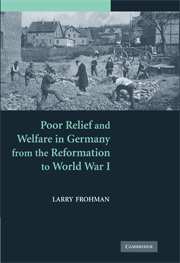Book contents
- Frontmatter
- Contents
- List of Tables and Figure
- Acknowledgments
- Introduction
- 1 Discipline, Community, and the Sixteenth-Century Origins of Modern Poor Relief
- 2 The Rise and Fall of the Workhouse: Poor Relief in the Age of Absolutism
- 3 Pauperism, Moral Reform, and Visions of Civil Society, 1800–1870
- 4 The State, the Market, and the Organization of Poor Relief, 1830–1870
- 5 The Assistantial Double Helix: Poor Relief, Social Insurance, and the Political Economy of Poor Law Reform
- 6 New Voices: Citizenship, Social Reform, and the Origins of Modern Social Work in Imperial Germany
- 7 The Social Perspective on Poverty and the Origins of Modern Social Welfare
- 8 From Fault to Risk: Changing Strategies of Assistance to the Jobless in Imperial Germany
- 9 Youth Welfare and the Political Alchemy of Juvenile Justice
- 10 The Social Evolution of Poor Relief, the Crisis of Voluntarism, and the Limits of Progressive Social Reform
- 11 Family, Welfare, and (Dis)order on the Home Front
- 12 Wartime Youth Welfare and the Progressive Refiguring of the Social Contract
- Conclusion: The End of Poor Relief and the Invention of Welfare
- Sources and Abbreviations
- Index
- References
10 - The Social Evolution of Poor Relief, the Crisis of Voluntarism, and the Limits of Progressive Social Reform
Published online by Cambridge University Press: 17 July 2009
- Frontmatter
- Contents
- List of Tables and Figure
- Acknowledgments
- Introduction
- 1 Discipline, Community, and the Sixteenth-Century Origins of Modern Poor Relief
- 2 The Rise and Fall of the Workhouse: Poor Relief in the Age of Absolutism
- 3 Pauperism, Moral Reform, and Visions of Civil Society, 1800–1870
- 4 The State, the Market, and the Organization of Poor Relief, 1830–1870
- 5 The Assistantial Double Helix: Poor Relief, Social Insurance, and the Political Economy of Poor Law Reform
- 6 New Voices: Citizenship, Social Reform, and the Origins of Modern Social Work in Imperial Germany
- 7 The Social Perspective on Poverty and the Origins of Modern Social Welfare
- 8 From Fault to Risk: Changing Strategies of Assistance to the Jobless in Imperial Germany
- 9 Youth Welfare and the Political Alchemy of Juvenile Justice
- 10 The Social Evolution of Poor Relief, the Crisis of Voluntarism, and the Limits of Progressive Social Reform
- 11 Family, Welfare, and (Dis)order on the Home Front
- 12 Wartime Youth Welfare and the Progressive Refiguring of the Social Contract
- Conclusion: The End of Poor Relief and the Invention of Welfare
- Sources and Abbreviations
- Index
- References
Summary
As we saw in Chapter 3, voluntarism was the logical correlate of the limited state, and the importance of this voluntaristic impulse, as well as the pathos attached to it by the propertied classes, was reinforced by both the refusal to codify a right to assistance and the belief that personal intercourse between rich and poor was peculiarly well suited to combating the social problem as it was understood across much of the nineteenth century, that is, as a problem of individual character. This combination of “providence, paternalism, and philanthropy” within the framework of the limited state also defined the political rationality of public assistance in Germany from the Vormärz until the end of the century. At the turn of the century, though, the idea that need was due more to the structural inequalities of the bourgeois social order than to individual character failings implied to a growing number of observers that disadvantaged persons should enjoy more explicit rights to social services that would not simply keep them from starving, but rather would put them in a position to more fully realize their own potential and enjoy the rights and duties associated with political citizenship. This trend was reinforced by the greater participation of the working classes in political and social life, at both the local and the national levels, and these developments combined to set in motion a rethinking of the nature and purpose of social assistance that called into question every element of this liberal, voluntaristic paradigm.
- Type
- Chapter
- Information
- Publisher: Cambridge University PressPrint publication year: 2008

